
On June 30, a spam article was posted to WikiTribune, Jimmy Wales’ news startup that argued “news is broken and we can fix it.” “International Airport Escort service In Mumbai,” it read. “I Provide Good Quality Educated Profile At Very Low 100% Safe And Original. 100 % Satisfied Guaranteed (Age- 19-25) College Girls.”
A contributor quickly flagged the post on WikiTribune’s public Slack and changed the page’s view to “private,” resulting in a 404 error for anyone who clicked on the link. The 404 page’s wording then became the topic of discussion.

In the newsroom of the future, things are still being worked out. But everything is up for debate.
WikiTribune was unveiled in April 2017 with big promises. A community of professional and citizen journalists would work side by side, reporting, fact-checking, combating fake news, and pulling in enough money from readers to support staff journalists and turn a profit.“The decline of revenue and the incredible pressures on the industry means we need to find new ways of lowering the costs of doing journalism,” Wales — WikiTribune’s CEO and Wikipedia cofounder — said at the Global Editors Network summit this spring. “One way of doing that is legitimately engaging the community. And not just to get more pageviews, but to really get to more quality.”
If you visit WikiTribune today, it looks like a to-do list app. The photos and big headlines of earlier iterations are gone, replaced by a graphics-less grid. That’s intentional. “It doesn’t look like a traditional news site, more like reddit. And that’s the point,” Wales wrote on WikiTribune’s “Feedback on everything please?” page recently. “We want people to pop in and understand immediately that this isn’t ‘broadcast’ like CNN or the BBC or Fox, it’s ‘participation’ — you can edit.”

Stories are ordered based on when they were last edited. As of Tuesday morning, the top stories were “India’s sweeping anti money laundering agenda comes under scrutiny,” “Thai cave rescue a success as all those trapped brought out,” and “EU rejects copyright reform in victory for internet activists.” Each story has a column of edits along the right-hand side; some, like this one on California’s consumer privacy law, were shells, with a headline and a list of editor-written questions: “What are the benefits this law will have on citizens? Will this set the precedent for other U.S. states to follow? What have critics said about the law?” Without looking closely, it can be hard to tell how recent a story is (an eight-month-old interview with Gloria Steinem was in the eighth slot on the homepage Tuesday). You can sort stories by topic, but there’s no way to tell which are more or less important, which are close to complete and which are shells.
This new, “raw” design was rolled out at the end of May. Before the redesign, Wales wrote to the site’s email list, WikiTribune had started to feel complex and intimidating despite being “beautiful.”
“We didn’t really have genuine community control, and we didn’t get very much work done,” he wrote. The relaunch is not just in style, but in concept. “The push is to turn over genuine control to the community, to let people work live without a net. It’s about trusting you, and it’s about welcoming you.” A new front-end editor was rolled out this week, making it easier for anybody to hop in and start editing.
“I realized that I built Nupedia again — too top-down, too restrained, not trusting enough,” Wales told me in a Slack DM last month. (Nupedia was the predecessor of Wikipedia, but it required a seven-step, editor-driven approval process for any updates to any of its content; in its three years of operations, only 25 fully approved articles were actually published.) “I should have known better, but hey, at least this time it only took me a year to realize it — last time it took two.”
“When community members read a complete story, signed by a journalist, they don’t feel comfortable to change or improve it,” Orit Kopel, cofounder of WikiTribune and CEO of the Jimmy Wales Foundation, told me in an email. “Unless they identified a typo or a meaningful error, they were pretty much deterred from touching it. With the new design, we wanted to deliberately project an incomplete work, raw material and initial stories which invite the readers to expand, improve, and lead them…We’re just in early days of the new design, but it seems to communicate our vision better and increase participation already.”
What does it look like when the community takes control? I’ve spent the past few weeks immersed in WikiTribune’s article sidebars and its public Slack, trying to get a better sense of how it runs. Doing so, I’ve seen both the promise and the pitfalls of WikiTribune’s model. On the one hand, it’s admirably transparent: If you’ve always wanted to peek inside a news organization’s Slack channel (sorry to reach peak Nieman Lab niche), here’s a chance, sort of. On the other hand, it’s as annoying as any public Slack — dominated by the same men (its 150-ish users are about 90 percent male), rife with nitpicking, aggravatingly earnest discussion.
Here are a few things I noticed when I poked around. (In the screenshots below, I’ve blurred contributors’ avatars and usernames, but left visible the avatars of and usernames of WikiTribune staff. Anyone who creates a free WikiTribune account gets a link to join the Slack.)
— Wikitribune is losing money. Crowdfunding the site isn’t working (yet). On June 4, Wales shared a version of a presentation he’d just given to his team in London. One slide shows that the site is receiving around 20
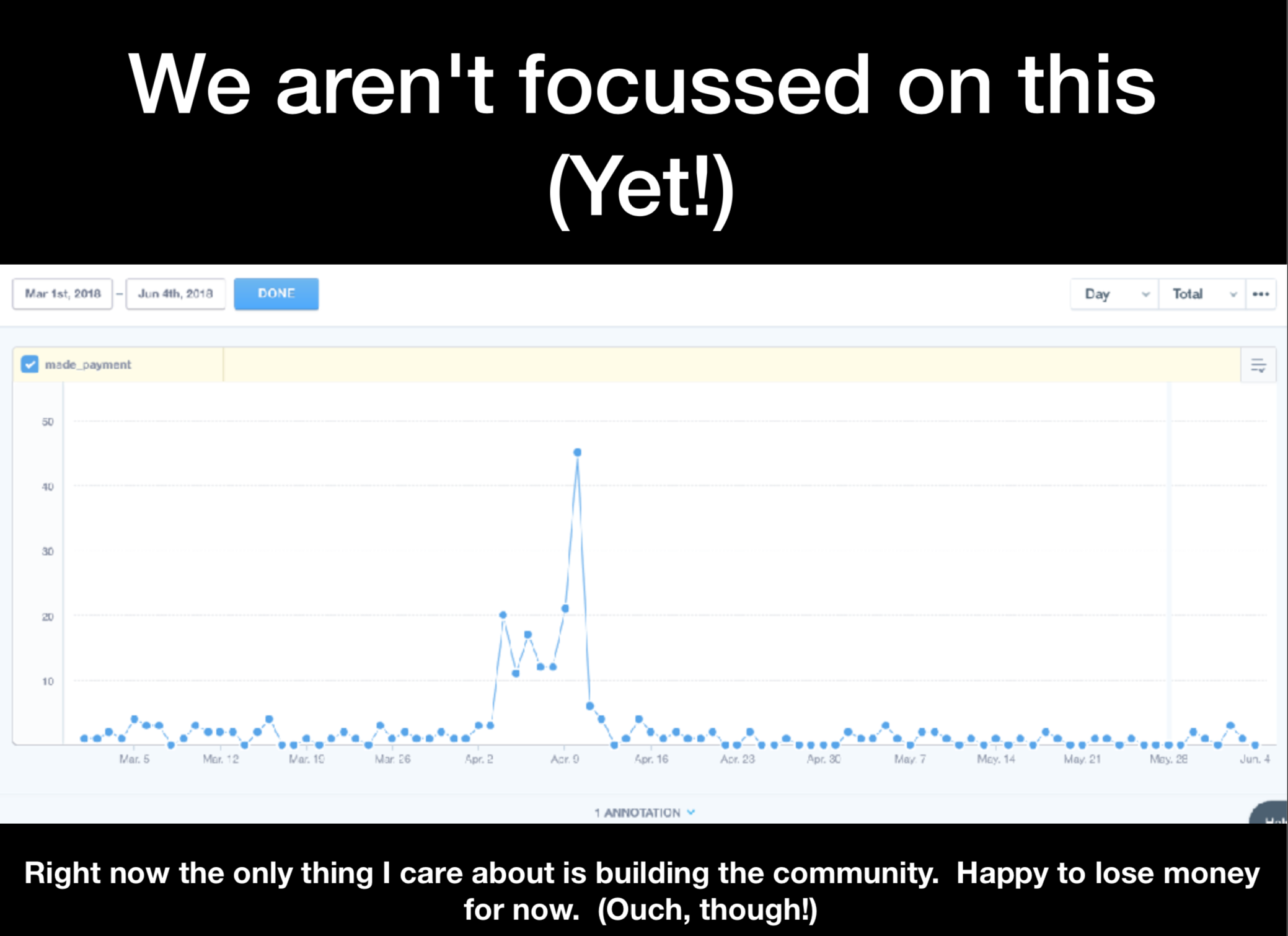
— Wikitribune’s traffic is low. The slide deck showed that, through early June, the site was receiving about 20,000 visits per week. One goal of the redesign was to increase traffic, which it seemed to, at least for the first week.
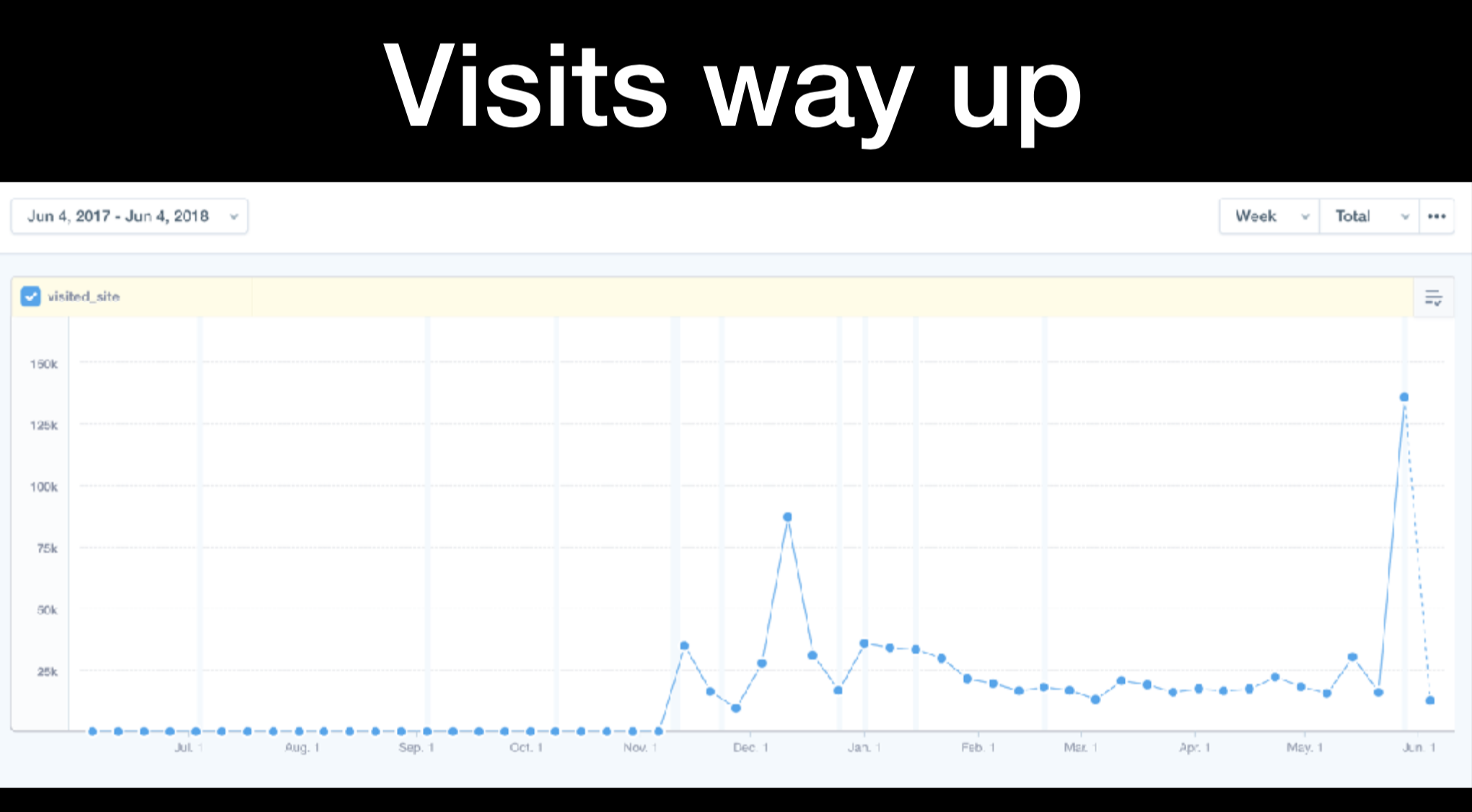
— The vast majority of the stories on the site are written and edited by WikiTribune staff, not the community. Most of the top 30 stories on the site are originated by and written by staff, with only minor edits like typo fixes coming from the community. Kopel told me that “In our vision, articles on WikiTribune are initiated and developed by the community, with professional support by our journalists if needed,” but it takes time to build and expand the community.
Of all the 144 changes made to the site Tuesday — which includes starting or contributing significantly to an article, but also minor things like adding a tag, creating a new user account, or commenting on someone’s talk page — 112 were made by staff. Of the 61 changes that actually involved creating or updating something in an article, all but 4 were made by WikiTribune staff.
Some areas seem especially promising for the type of community contribution that Kopel and Wales envision. For instance: “What is novichok, the nerve agent blamed for British attack?” is written almost completely by WikiTribune staff, but a reader added some information on how the chemistry of novichok works. In a story on Greenland’s high suicide rate, a reader added the name of Greenland’s indigenous people. And post on sea level rise had an unusually large number of contributors, who added details on places affected, science, and academic references.
— The debate over hierarchy and structure continues. How necessary are they? Do they slow things down or are they necessary for WikiTribune to function? When I interviewed then-editor Peter Bale in March, he told me about the hierarchy he’d tried to create. But it was pretty clear that Wales was fundamentally opposed to the system Bale was building. Bale:We’ve created a very systematic approach to journalism, which suits a young team, where you need — not exactly an imposed style, but a bit of a style guide or stylistic approach can allow young, very inexperienced journalists to have a framework in which to write. It’s not dissimilar, though I wouldn’t give it the same level of strength, to the way Bloomberg approached it in the early years with The Bloomberg Way, in order to have a framework where they could take a very diverse group of people and turn them into quite good journalists very quickly.
On February 24, for instance, WikiTribune held a Slack “town hall.” Bale tried to lay out a schedule and structure for it:
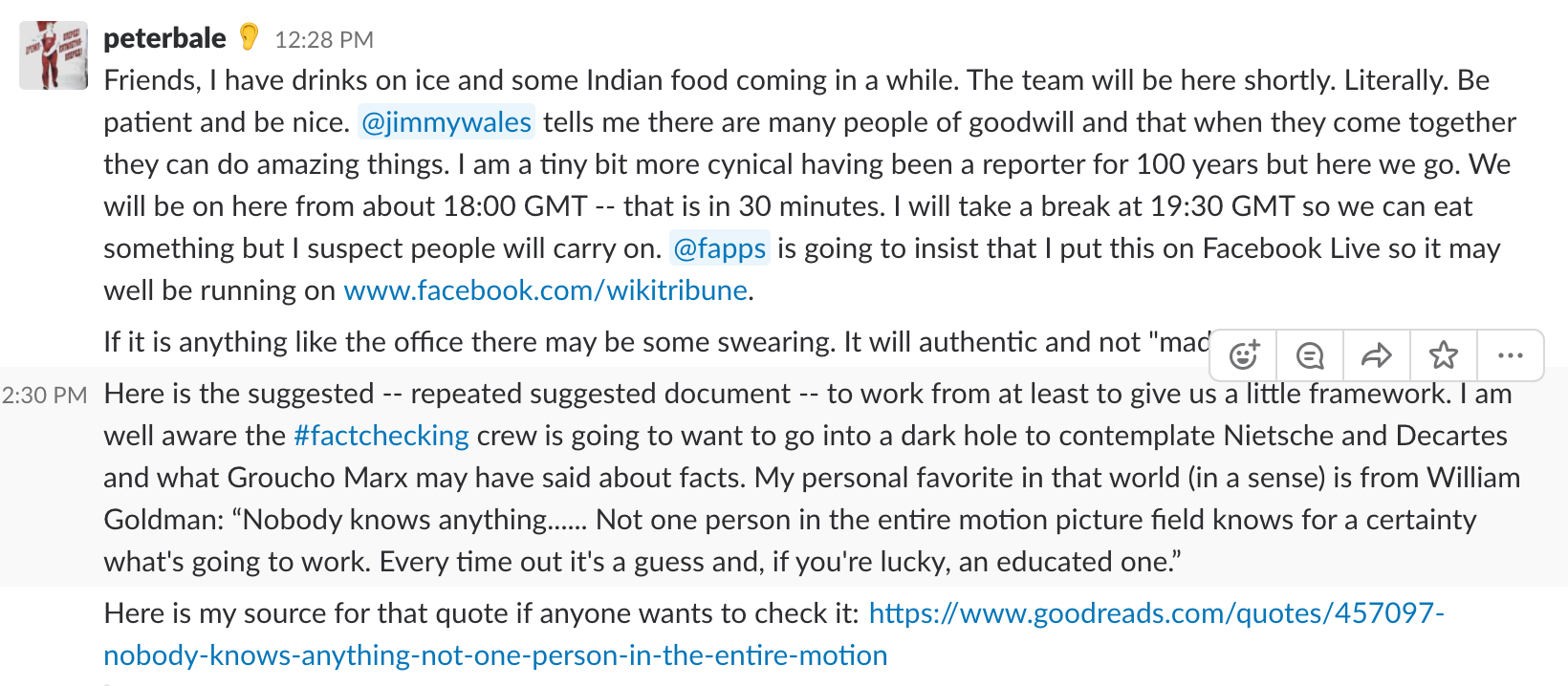
But it was difficult to keep the conversation moving in one direction as men poured in to the Slack with their own ideas. On how a WikiTribune gun control article should work, for instance:
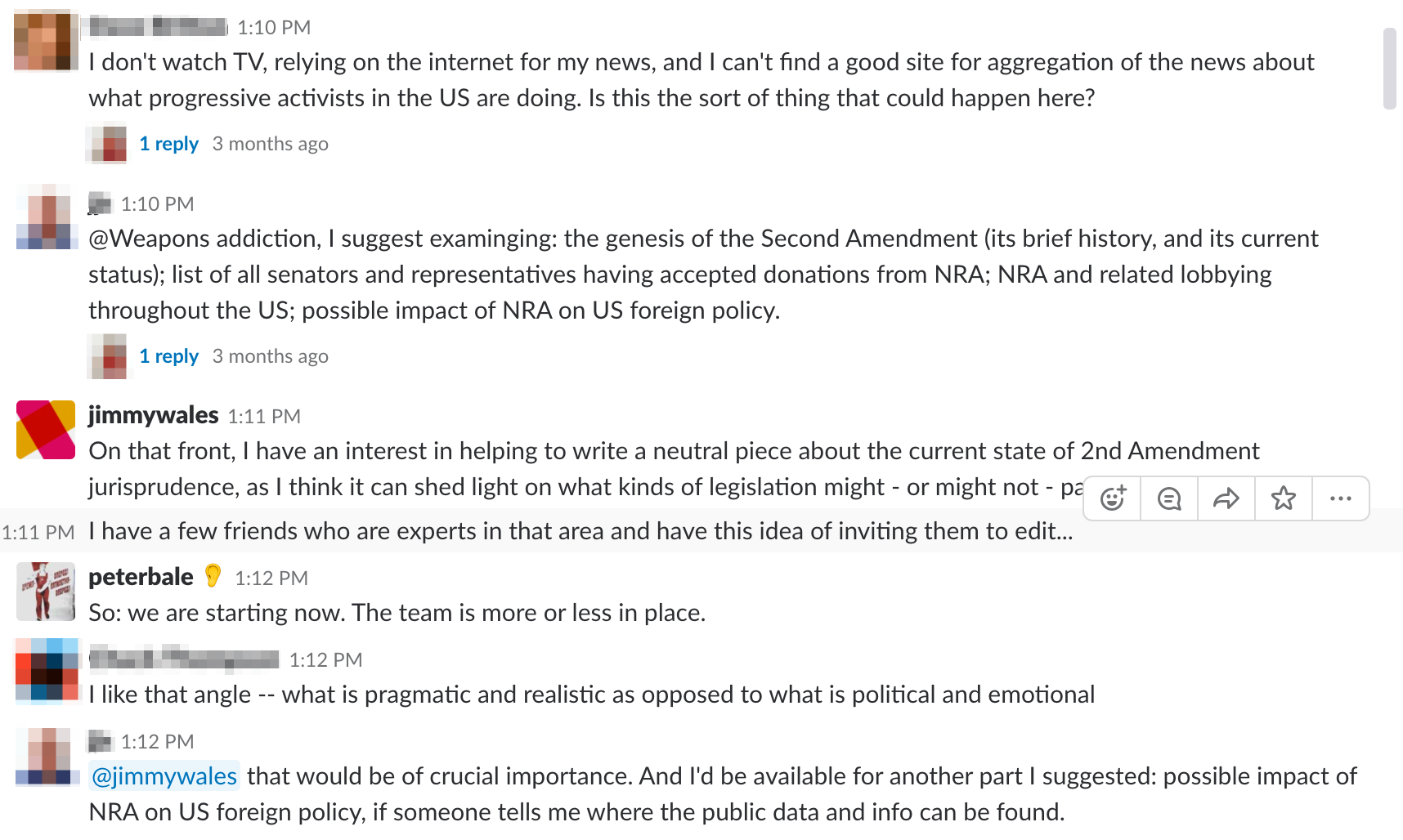
Bale left the company in April. The change at the end of May to make the site “more Wiki” and community-driven “is a pivot that [Wales] as the cofounder and leading practitioner of community engagement feels he has to make,” Bale told me recently. “I’m proud of what the small staff editorial team achieved for launch and the first six months of WikiTribune being live, publishing around 1,000 stories by them and the community, with a high level of quality, engagement, and some innovation. It’s a fascinating startup, but it also shows how demanding real journalism can be for a community platform to try to create.”
“‘Leadership structure’ isn’t a very Wiki phrase,” Wales told me in a Slack DM.
— “Neutrality” is a very difficult concept to define. “We do not do comment or opinion. We eradicate from our own work what could be perceived as commentary or opinion,” Bale told me in March. In practice, that leads to arguments over how objective anyone can ever actually be. (Plenty of other newsrooms are grappling with similar questions.)


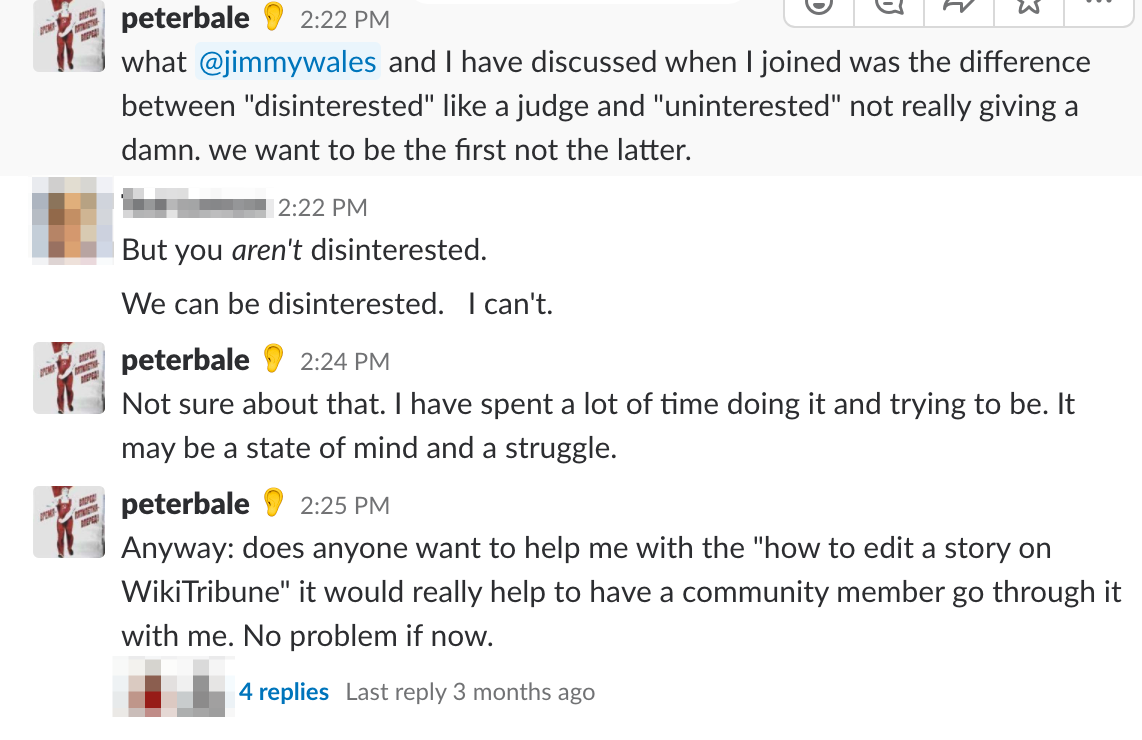

— Wales’ ambition for the site is huge, but it still isn’t always completely clear yet how different WikiTribune will be in subject matter and editorial approach from Wikipedia (other than WikiTribune being ostensibly for-profit).




And contributors debate how and whether WikiTribune should cover breaking news at all.
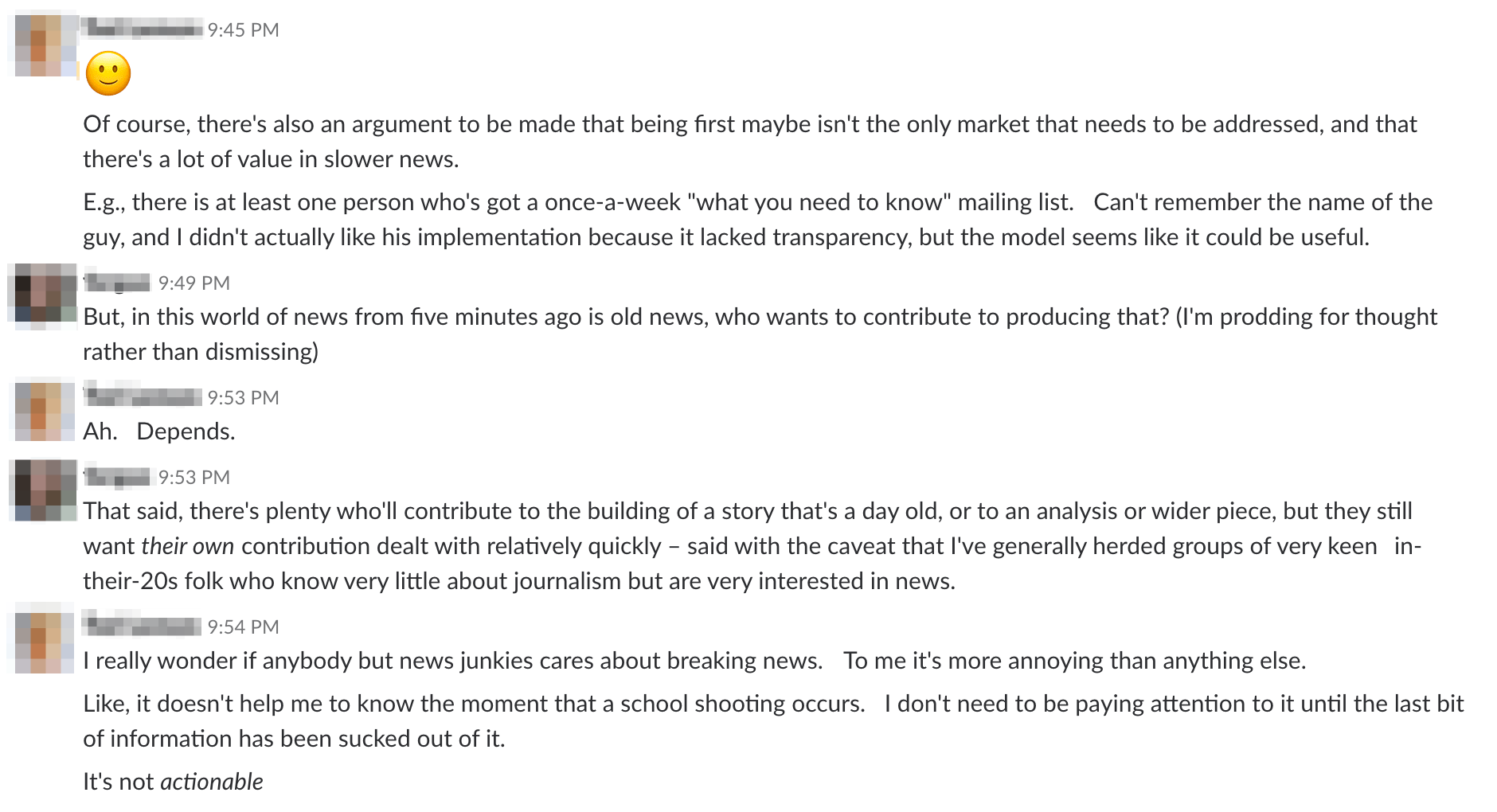
— WikiTribune is not exempt from the problem of too many Slack channels…

— …or from men speaking patronizingly to women.
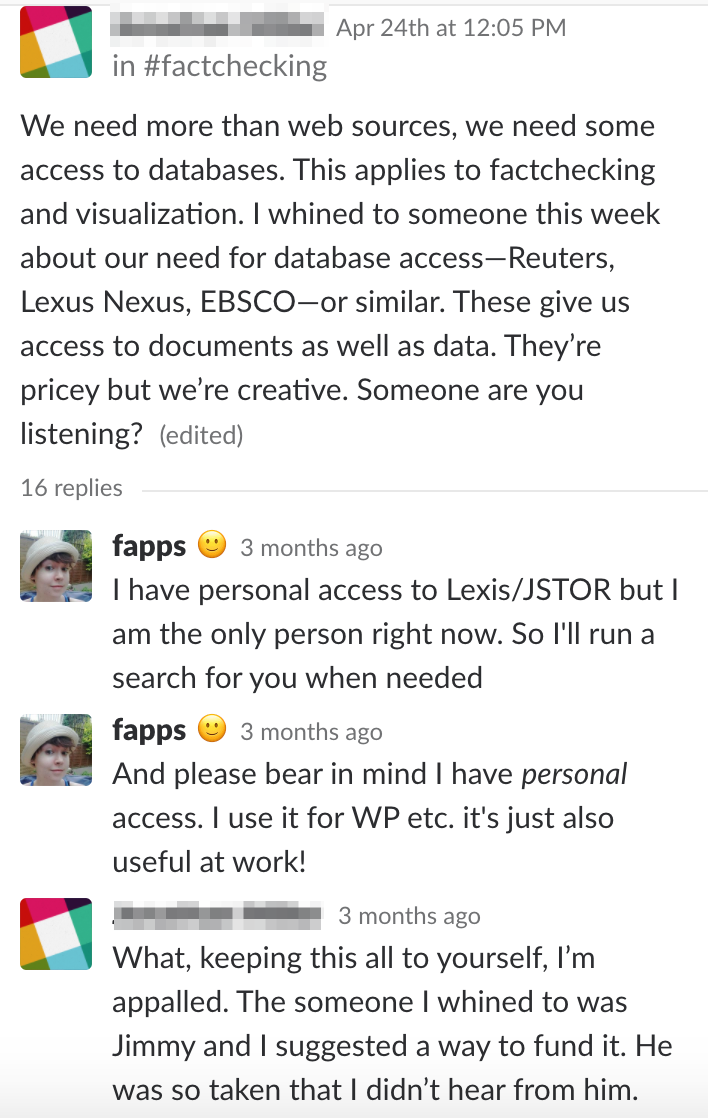

— These two, I just thought were funny.

